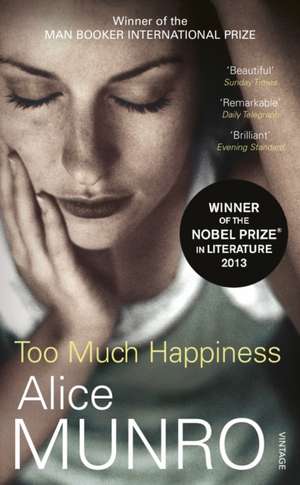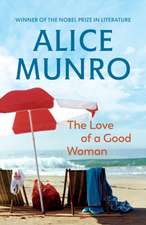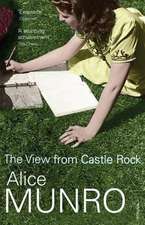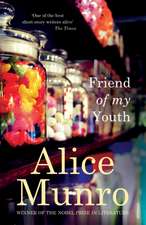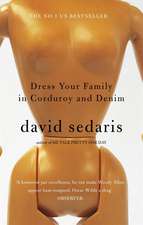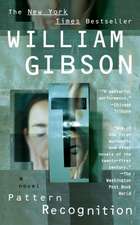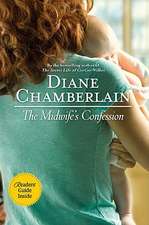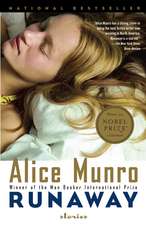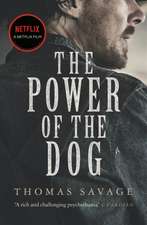Too Much Happiness
Autor Alice Munroen Limba Engleză Paperback – 2 sep 2010
With clarity and ease, Alice Munro once again renders complex, difficult events and emotions into stories about the unpredictable ways in which men and women accommodate and often transcend what happens in their lives.
In the first story a young wife and mother, suffering from the unbearable pain of losing her three children, gains solace from a most surprising source. In another, a young woman, in the aftermath of an unusual and humiliating seduction, reacts in a clever if less-than-admirable fashion. Other tales uncover the “deep-holes” in a marriage, the unsuspected cruelty of children, and, in the long title story, the yearnings of a nineteenth-century female mathematician.
| Toate formatele și edițiile | Preț | Express |
|---|---|---|
| Paperback (3) | 53.68 lei 23-34 zile | +19.94 lei 6-10 zile |
| Random House – 2 sep 2010 | 53.68 lei 23-34 zile | +19.94 lei 6-10 zile |
| Random House – 2 sep 2010 | 71.73 lei 17-23 zile | +6.21 lei 6-10 zile |
| Vintage Books USA – 31 oct 2010 | 96.87 lei 6-8 săpt. |
Preț: 71.73 lei
Nou
Puncte Express: 108
Preț estimativ în valută:
13.73€ • 14.18$ • 11.42£
13.73€ • 14.18$ • 11.42£
Carte disponibilă
Livrare economică 01-07 martie
Livrare express 18-22 februarie pentru 16.20 lei
Preluare comenzi: 021 569.72.76
Specificații
ISBN-13: 9780099552444
ISBN-10: 0099552442
Pagini: 303
Dimensiuni: 108 x 177 x 25 mm
Greutate: 0.18 kg
Editura: Random House
Colecția Vintage Books
ISBN-10: 0099552442
Pagini: 303
Dimensiuni: 108 x 177 x 25 mm
Greutate: 0.18 kg
Editura: Random House
Colecția Vintage Books
Descriere
Descriere de la o altă ediție sau format:
**Winner of the Nobel Prize in Literature**These are beguiling, provocative stories about manipulative men and the women who outwit them, about destructive marriages and curdled friendships, about mothers and sons, about moments which change or haunt a life.
**Winner of the Nobel Prize in Literature**These are beguiling, provocative stories about manipulative men and the women who outwit them, about destructive marriages and curdled friendships, about mothers and sons, about moments which change or haunt a life.
Notă biografică
Alice Munro grew up in Wingham, Ontario, and attended the University of Western Ontario. She has published twelve collections of stories and two volumes of selected stories, as well as a novel. During her distinguished career she has been the recipient of many awards and prizes, including three of Canada's Governor General's Literary Awards and two of its Giller Prizes, the Rea Award for the Short Story, the Lannan Literary Award, England's W. H. Smith Book Award, the United States' National Book Critics Circle Award, the Edward MacDowell Medal in literature, and the Man Booker International Prize. Her stories have appeared in The New Yorker, The Atlantic Monthly, The Paris Review, and other publications, and her collections have been translated into thirteen languages.
Alice Munro lives in Clinton, Ontario, near Lake Huron.
Alice Munro lives in Clinton, Ontario, near Lake Huron.
Extras
Too Much Happiness
Many persons who have not studied mathematics confuse it
with arithmetic and consider it a dry and arid science.
Actually, however, this science requires great fantasy.
—Sophia Kovalevsky
i
On the first day of January, in the year 1891, a small woman and a large man are walking in the Old Cemetery, in Genoa. Both
of them are around forty years old. The woman has a childishly large head, with a thicket of dark curls, and her expression is eager, faintly pleading. Her face has begun to look worn. The man is immense. He weighs 285 pounds, distributed over a large frame, and being Russian, he is often referred to as a bear, also as a Cossack. At present he is crouching over tombstones and writing in his notebook, collecting inscriptions and puzzling over abbreviations not immediately clear to him, though he speaks Russian, French, English, Italian and has an understanding of classical and medieval Latin. His knowledge is as expansive as his physique, and though his speciality is governmental law, he is capable of lecturing on the growth of contemporary political institutions in America, the peculiarities of society in Russia and the West, and the laws and practices of ancient empires. But he is not a pedant. He is witty and popular, at ease on various levels, and able to live a most comfortable life, due to his properties near Kharkov. He has, however, been forbidden to hold an academic post in Russia, because of being a Liberal.
His name suits him. Maksim. Maksim Maksimovich Kovalevsky.
The woman with him is also a Kovalevsky. She was married to a distant cousin of his, but is now a widow.
She speaks to him teasingly.
“You know that one of us will die,” she says. “One of us will die this year.”
Only half listening, he asks her, Why is that?
“Because we have gone walking in a graveyard on the first day of the New Year.”
“Indeed.”
“There are still a few things you don’t know,” she says in her pert but anxious way. “I knew that before I was eight years old.”
“Girls spend more time with kitchen maids and boys in the
stables—I suppose that is why.”
“Boys in the stables do not hear about death?”
“Not so much. Concentration is on other things.”
There is snow that day but it is soft. They leave melted, black footprints where they’ve walked.
She met him for the first time in 1888. He had come to Stockholm to advise on the foundation of a school of social sciences. Their shared nationality, going so far as a shared family name, would have thrown them together even if there was no particular attraction. She would have had a responsibility to entertain and generally take care of a fellow Liberal, unwelcome at home.
But that turned out to be no duty at all. They flew at each other as if they had indeed been long-lost relatives. A torrent of jokes and questions followed, an immediate understanding, a rich gabble of Russian, as if the languages of Western Europe had been flimsy formal cages in which they had been too long confined, or paltry substitutes for true human speech. Their behavior, as well, soon overflowed the proprieties of Stockholm.
He stayed late at her apartment. She went alone to lunch with him at his hotel. When he hurt his leg in a mishap on the ice, she helped him with the soaking and dressing and, what was more, she told people about it. She was so sure of herself then, and especially sure of him. She wrote a description of him to a friend, borrowing from De Musset.
He is very joyful, and at the same time very gloomy—
Disagreeable neighbor, excellent comrade—
Extremely light-minded, and yet very affected—
Indignantly naïve, nevertheless very blasé—
Terribly sincere, and at the same time very sly.
And at the end she wrote, “A real Russian, he is, into the bargain.”
Fat Maksim, she called him then.
“I have never been so tempted to write romances, as when with Fat Maksim.”
And “He takes up too much room, on the divan and in one’s mind. It is simply impossible for me, in his presence, to think of
anything but him.”
This was at the very time when she should have been working day and night, preparing her submission for the Bordin Prize. “I am neglecting not only my Functions but my Elliptic Integrals and my Rigid Body,” she joked to her fellow mathematician, Mittag-Leffler, who persuaded Maksim that it was time to go and deliver lectures in Uppsala for a while. She tore herself from thoughts of him, from daydreams, back to the movement of rigid bodies and the solution of the so-called mermaid problem by the use of theta functions with two independent variables. She worked desperately but happily, because he was still in the back of her mind. When he returned she was worn out but triumphant. Two triumphs—her paper ready for its last polishing and anonymous submission; her lover growling but cheerful, eagerly returned from his banishment and giving every indication, as she thought, that he intended to make her the woman of his life.
The Bordin Prize was what spoiled them. So Sophia believed. She herself was taken in by it at first, dazzled by all the chandeliers
and champagne. The compliments quite dizzying, the marvelling and the hand kissing spread thick on top of certain inconvenient but immutable facts. The fact that they would never grant her a job worthy of her gift, that she would be lucky indeed to find herself teaching in a provincial girls’ high school. While she was basking Maksim decamped. Never a word about the real reason, of course—just the papers he had to write, his need for the peace and quiet of Beaulieu.
He had felt himself ignored. A man who was not used to being ignored, who had probably never been in any salon, at any reception, since he was a grown man, where that had been the case. And it wasn’t so much the case in Paris either. It wasn’t
that he was invisible there, in Sonya’s limelight, as that he was the usual. A man of solid worth and negotiable reputation, with
a certain bulk of frame and intellect, together with a lightness of wit, an adroit masculine charm. While she was an utter novelty,
a delightful freak, the woman of mathematical gifts and female timidity, quite charming, yet with a mind most unconventionally
furnished, under her curls.
He wrote his cold and sulky apologies from Beaulieu, refusing her offer to visit once her flurry was over. He had a lady staying with him, he said, whom he could not possibly present to her. This lady was in distress and needed his attention at the moment. Sonya should make her way back to Sweden, he said; she should be happy where her friends were waiting for her. Her students would have need of her and so would her little daughter. (A jab there, a suggestion familiar to her, of faulty motherhood?)
And at the end of his letter one terrible sentence.
“If I loved you I would have written differently.”
The end of everything. Back from Paris with her prize and her freaky glittery fame, back to her friends who suddenly meant no more than a snap of her fingers to her. Back to the students who meant something more, but only when she stood before them transformed into her mathematical self, which was oddly still accessible. And back to her supposedly neglected but devastatingly
merry little Fufu.
Everything in Stockholm reminded her.
She sat in the same room, with the furniture brought at such foolish expense across the Baltic Sea. The same divan in front of her that had recently, gallantly, supported his bulk. And hers in addition when he skillfully gathered her into his arms. In spite of his size he was never clumsy in lovemaking.
This same red damask, on which distinguished and undistinguished guests had sat in her old lost home. Maybe Fyodor Dostoyevsky had sat there in his lamentable nervous state, dazzled by Sophia’s sister Aniuta. And certainly Sophia herself as her mother’s unsatisfactory child, displeasing as usual.
The same old cabinet brought also from her home at Pali - bino, with the portraits of her grandparents set into it, painted
on porcelain. The Shubert grandparents. No comfort there. He in uniform, she in a ball gown, displaying absurd self-satisfaction.
They had got what they wanted, Sophia supposed, and had only contempt for those not so conniving or so lucky.
“Did you know I’m part German?” she had said to Maksim.
“Of course. How else could you be such a prodigy of industry? And have your head filled with mythical numbers?”
If I loved you.
Fufu brought her jam on a plate, asked her to play a child’s card game.
“Leave me alone. Can’t you leave me alone?”
Later she wiped the tears out of her eyes and begged the child’s pardon.
Many persons who have not studied mathematics confuse it
with arithmetic and consider it a dry and arid science.
Actually, however, this science requires great fantasy.
—Sophia Kovalevsky
i
On the first day of January, in the year 1891, a small woman and a large man are walking in the Old Cemetery, in Genoa. Both
of them are around forty years old. The woman has a childishly large head, with a thicket of dark curls, and her expression is eager, faintly pleading. Her face has begun to look worn. The man is immense. He weighs 285 pounds, distributed over a large frame, and being Russian, he is often referred to as a bear, also as a Cossack. At present he is crouching over tombstones and writing in his notebook, collecting inscriptions and puzzling over abbreviations not immediately clear to him, though he speaks Russian, French, English, Italian and has an understanding of classical and medieval Latin. His knowledge is as expansive as his physique, and though his speciality is governmental law, he is capable of lecturing on the growth of contemporary political institutions in America, the peculiarities of society in Russia and the West, and the laws and practices of ancient empires. But he is not a pedant. He is witty and popular, at ease on various levels, and able to live a most comfortable life, due to his properties near Kharkov. He has, however, been forbidden to hold an academic post in Russia, because of being a Liberal.
His name suits him. Maksim. Maksim Maksimovich Kovalevsky.
The woman with him is also a Kovalevsky. She was married to a distant cousin of his, but is now a widow.
She speaks to him teasingly.
“You know that one of us will die,” she says. “One of us will die this year.”
Only half listening, he asks her, Why is that?
“Because we have gone walking in a graveyard on the first day of the New Year.”
“Indeed.”
“There are still a few things you don’t know,” she says in her pert but anxious way. “I knew that before I was eight years old.”
“Girls spend more time with kitchen maids and boys in the
stables—I suppose that is why.”
“Boys in the stables do not hear about death?”
“Not so much. Concentration is on other things.”
There is snow that day but it is soft. They leave melted, black footprints where they’ve walked.
She met him for the first time in 1888. He had come to Stockholm to advise on the foundation of a school of social sciences. Their shared nationality, going so far as a shared family name, would have thrown them together even if there was no particular attraction. She would have had a responsibility to entertain and generally take care of a fellow Liberal, unwelcome at home.
But that turned out to be no duty at all. They flew at each other as if they had indeed been long-lost relatives. A torrent of jokes and questions followed, an immediate understanding, a rich gabble of Russian, as if the languages of Western Europe had been flimsy formal cages in which they had been too long confined, or paltry substitutes for true human speech. Their behavior, as well, soon overflowed the proprieties of Stockholm.
He stayed late at her apartment. She went alone to lunch with him at his hotel. When he hurt his leg in a mishap on the ice, she helped him with the soaking and dressing and, what was more, she told people about it. She was so sure of herself then, and especially sure of him. She wrote a description of him to a friend, borrowing from De Musset.
He is very joyful, and at the same time very gloomy—
Disagreeable neighbor, excellent comrade—
Extremely light-minded, and yet very affected—
Indignantly naïve, nevertheless very blasé—
Terribly sincere, and at the same time very sly.
And at the end she wrote, “A real Russian, he is, into the bargain.”
Fat Maksim, she called him then.
“I have never been so tempted to write romances, as when with Fat Maksim.”
And “He takes up too much room, on the divan and in one’s mind. It is simply impossible for me, in his presence, to think of
anything but him.”
This was at the very time when she should have been working day and night, preparing her submission for the Bordin Prize. “I am neglecting not only my Functions but my Elliptic Integrals and my Rigid Body,” she joked to her fellow mathematician, Mittag-Leffler, who persuaded Maksim that it was time to go and deliver lectures in Uppsala for a while. She tore herself from thoughts of him, from daydreams, back to the movement of rigid bodies and the solution of the so-called mermaid problem by the use of theta functions with two independent variables. She worked desperately but happily, because he was still in the back of her mind. When he returned she was worn out but triumphant. Two triumphs—her paper ready for its last polishing and anonymous submission; her lover growling but cheerful, eagerly returned from his banishment and giving every indication, as she thought, that he intended to make her the woman of his life.
The Bordin Prize was what spoiled them. So Sophia believed. She herself was taken in by it at first, dazzled by all the chandeliers
and champagne. The compliments quite dizzying, the marvelling and the hand kissing spread thick on top of certain inconvenient but immutable facts. The fact that they would never grant her a job worthy of her gift, that she would be lucky indeed to find herself teaching in a provincial girls’ high school. While she was basking Maksim decamped. Never a word about the real reason, of course—just the papers he had to write, his need for the peace and quiet of Beaulieu.
He had felt himself ignored. A man who was not used to being ignored, who had probably never been in any salon, at any reception, since he was a grown man, where that had been the case. And it wasn’t so much the case in Paris either. It wasn’t
that he was invisible there, in Sonya’s limelight, as that he was the usual. A man of solid worth and negotiable reputation, with
a certain bulk of frame and intellect, together with a lightness of wit, an adroit masculine charm. While she was an utter novelty,
a delightful freak, the woman of mathematical gifts and female timidity, quite charming, yet with a mind most unconventionally
furnished, under her curls.
He wrote his cold and sulky apologies from Beaulieu, refusing her offer to visit once her flurry was over. He had a lady staying with him, he said, whom he could not possibly present to her. This lady was in distress and needed his attention at the moment. Sonya should make her way back to Sweden, he said; she should be happy where her friends were waiting for her. Her students would have need of her and so would her little daughter. (A jab there, a suggestion familiar to her, of faulty motherhood?)
And at the end of his letter one terrible sentence.
“If I loved you I would have written differently.”
The end of everything. Back from Paris with her prize and her freaky glittery fame, back to her friends who suddenly meant no more than a snap of her fingers to her. Back to the students who meant something more, but only when she stood before them transformed into her mathematical self, which was oddly still accessible. And back to her supposedly neglected but devastatingly
merry little Fufu.
Everything in Stockholm reminded her.
She sat in the same room, with the furniture brought at such foolish expense across the Baltic Sea. The same divan in front of her that had recently, gallantly, supported his bulk. And hers in addition when he skillfully gathered her into his arms. In spite of his size he was never clumsy in lovemaking.
This same red damask, on which distinguished and undistinguished guests had sat in her old lost home. Maybe Fyodor Dostoyevsky had sat there in his lamentable nervous state, dazzled by Sophia’s sister Aniuta. And certainly Sophia herself as her mother’s unsatisfactory child, displeasing as usual.
The same old cabinet brought also from her home at Pali - bino, with the portraits of her grandparents set into it, painted
on porcelain. The Shubert grandparents. No comfort there. He in uniform, she in a ball gown, displaying absurd self-satisfaction.
They had got what they wanted, Sophia supposed, and had only contempt for those not so conniving or so lucky.
“Did you know I’m part German?” she had said to Maksim.
“Of course. How else could you be such a prodigy of industry? And have your head filled with mythical numbers?”
If I loved you.
Fufu brought her jam on a plate, asked her to play a child’s card game.
“Leave me alone. Can’t you leave me alone?”
Later she wiped the tears out of her eyes and begged the child’s pardon.
Recenzii
“Filled with subtle and far-reaching thematic reverberations. . . . [Munro has] an empathy so pitch-perfect. . . . You [are] drawn deftly into another world.” —The New York Times Book Review
"Profound and beautiful.” —Francine Prose, O, The Oprah Magazine
“Alice Munro has done it again. . . . [She] keeps getting better. . . . Her brush strokes are fine, her vision encompasses humanity from its most generous to its most corrupt, and the effect is nothing short of masterful.” —The San Francisco Chronicle
“Richly detailed and dense with psychological observation. . . . Munro exhibit[s] a remarkable gift for transforming the seemingly artless into art . . . [She] concentrate[s] upon provincial, even backcountry lives, in tales of domestic tragicomedy that seem to open up, as if by magic, into wider, deeper, vaster dimensions.” —Joyce Carol Oates, New York Review of Books
“A perfect 10. . . . With this collection of surprising short stories, Munro once again displays the fertility of her imagination and her craftsmanship as a writer.” —USA Today
“Masterly. . . . [A] remarkable new book.” —The Los Angeles Times
“Daring and unpredictable. . . . Reading Munro is an intensely personal experience. Her focus is so clear and her style so precise. . . . Each [story is] dramatically and subtly different.” —The Miami Herald
“A brand-new collection of short stories from Alice Munro—winner of a Man Booker Prize—is always cause for celebration, and Too Much Happiness doesn’t disappoint. It dazzles. The 10 spare, lovely tales are . . . brimming with emotion and memorable characters. . . . Munro’s are stories that linger long after you turn the last page.” —Entertainment Weekly, Grade A
“Finely, even ingeniously, crafted. . . . Deliver[ed] with instinctive acuity.” —The Seattle Times
“Rich. . . . Truthful, in the deepest sense of the word. . . . Reading an Alice Munro short story is like sinking into a reverie. She expertly captures the shadings and byways of associative thought. . . . [Munro] will surely be remembered as the writer who took the short story to the depth of what short fiction can plumb.” —The Kansas City Star, Best 100 Books of 2009
“Rich and satisfying. . . . A commanding collection and one of her strongest. . . . Short fiction of this caliber should be on everyone’s reading list. Munro’s stories are accessible; she simply writes about life. . . . Honest, intuitive storytelling that gives the short story a good name.” —Chicago Sun-Times
“There's never too much happiness in a Munro collection, just sentence after sentence to die for.” —Louisville Courier-Journal
“[Munro is] universally acknowledged as one of the greatest short-story writers of our time. . . . [Her] work [is] at such a high level. . . . These stories are extraordinary, ample with the shrewdness and empathy that we have come to take for granted in Munro. . . . Her most distinguishing characteristic as a writer is . . . her extraordinary intimacy with her characters.” —The New Republic
“Coherent and compelling. . . . Munro manages to turn the sentimental into the existential.” —The Philadelphia Inquirer
“Stunning. . . . An unexpected gift. . . . Here we have 10 perfectly honed pieces, each a study of the human psyche in hard-to-imagine circumstances that Munro presents, seemingly effortlessly, in an economy of words and sentences.” —The Buffalo News
“As always in her distinctive stories, Alice Murno’s style is vivid, her attention tireless, her curiosity omnivorous, and her sentences drawn from the freshest of springs.” —The Washington Post
“If there’s a better short story writer working today than Alice Munro, I haven’t read her. In story after story, Munro manages to compress whole lives and emotional arcs into 20 or so shapely pages, long enough to engage us in their world but short enough to absorb in a single sitting or commute. Her prose is spare without feeling rushed or cryptic, at once lucid and subtle.” —Heller McAlpin, The Christian Science Monitor
“I sit still for Alice Munro’s expository passages every time. She lays down such seemingly ordinary but useful sentences, one after another after another. . . . I stay to marvel. . . . Is there anyone writing short fiction today in English who has more authority?” —Alan Cheuse, NPR
“Beautiful. . . . With great insights into human nature.” —The Grand Rapids Press
“All varying degrees of excellent. . . . A work of supreme observational power, employing Munro’s deft, controlled sentences in the service of essaying characters who don’t realize they’re living their lives on the brink until revelation rushes over them.” —The A.V. Club
“Another piercing collection. . . . It’s a testament to Munro’s mastery that she can make the lurid sing with nuance and explicability. . . . Her ear for dialogue is unerring. . . . Whatever format you favor in storytelling, go ahead and enter Too Much Happiness. It will carry you safely through the gates, and no doubt send you looking for other castles constructed by the stunning Alice Munro.” —The Plain Dealer
“Shows Munro’s skills at their best.” —The Pittsburgh Post-Gazette
“Outstanding. . . . [Munro] writes concise descriptions that bring characters and settings to life. . . . [and] throws in observations that serve as nuggets of wisdom.” —The Wichita Eagle
“Consistently engrossing . . . Thoughtfully wrought. . . . [The] material is given piercing clarity by the resolute simplicity and restraint of Ms. Munro’s prose. . . . She can raise hackles on the back of your neck with a precisely phrased unadorned verb or noun. . . . The Munro magic is showcased brilliantly.” —The Washington Times
“The unanticipated is in full force here, fresh and exciting. Munro seems to say that mundane lives constructed of order and routine are still governed by random acts. She hides human complexity in the ordinary until it surfaces in unimagined ways.” —The Providence Journal
“As poignant [and] chilling as they come. . . . Why [Munro] is rightly regarded as a master of the form is her deliberate, suspenseful layering of characters and circumstances. . . . Every story in Too Much Happiness is, in a sense, a life story. . . . It’s as if the characters are reading along with these mini life lessons, emerging with enviable wisdom and perspective.” —The L Magazine
“Munro is the master of the inevitable surprise. . . . [She] has an uncanny ability to take us inside a character’s mind.” —The St. Petersburg Times
“Few writers can match the clarity and immediacy of Munro’s descriptions whether she is portraying a subsiding marriage, a treacherous childhood, or the erotic and intellectual sojourn of a 19th century Russian mathematician.” — The Boston Globe
“These ten short stories cement the capstone on what fellow Canadian Margaret Atwood has described as Munro’s ascent to ‘international literary sainthood’. . . . The title story . . . is, in length and scope, Munro’s most ambitious story to date. . . . May this house of hers, and its autumnal gardens, continue to be harvested to glorious effect.” —The Oregonian
“Intrigue and manipulation fill the vividly drawn stories in this collection.” —The Sacramento Bee
“More occurs in Munro’s short stories than in most novels. . . . The pieces here . . . are thrilling permutations of her recurring themes: love, regret, the re-framing of one’s own personal narrative over time.” —The New York Post
“More than virtually anyone else’s, Alice Munro’s stories unfold in surprising ways that nonetheless seem perfectly right. They are marvels of unhurried compression in which precision looks casual, in which everything is clearly in its place, though no one else might think to put it exactly thus.” —Minneapolis Star Tribune
"Profound and beautiful.” —Francine Prose, O, The Oprah Magazine
“Alice Munro has done it again. . . . [She] keeps getting better. . . . Her brush strokes are fine, her vision encompasses humanity from its most generous to its most corrupt, and the effect is nothing short of masterful.” —The San Francisco Chronicle
“Richly detailed and dense with psychological observation. . . . Munro exhibit[s] a remarkable gift for transforming the seemingly artless into art . . . [She] concentrate[s] upon provincial, even backcountry lives, in tales of domestic tragicomedy that seem to open up, as if by magic, into wider, deeper, vaster dimensions.” —Joyce Carol Oates, New York Review of Books
“A perfect 10. . . . With this collection of surprising short stories, Munro once again displays the fertility of her imagination and her craftsmanship as a writer.” —USA Today
“Masterly. . . . [A] remarkable new book.” —The Los Angeles Times
“Daring and unpredictable. . . . Reading Munro is an intensely personal experience. Her focus is so clear and her style so precise. . . . Each [story is] dramatically and subtly different.” —The Miami Herald
“A brand-new collection of short stories from Alice Munro—winner of a Man Booker Prize—is always cause for celebration, and Too Much Happiness doesn’t disappoint. It dazzles. The 10 spare, lovely tales are . . . brimming with emotion and memorable characters. . . . Munro’s are stories that linger long after you turn the last page.” —Entertainment Weekly, Grade A
“Finely, even ingeniously, crafted. . . . Deliver[ed] with instinctive acuity.” —The Seattle Times
“Rich. . . . Truthful, in the deepest sense of the word. . . . Reading an Alice Munro short story is like sinking into a reverie. She expertly captures the shadings and byways of associative thought. . . . [Munro] will surely be remembered as the writer who took the short story to the depth of what short fiction can plumb.” —The Kansas City Star, Best 100 Books of 2009
“Rich and satisfying. . . . A commanding collection and one of her strongest. . . . Short fiction of this caliber should be on everyone’s reading list. Munro’s stories are accessible; she simply writes about life. . . . Honest, intuitive storytelling that gives the short story a good name.” —Chicago Sun-Times
“There's never too much happiness in a Munro collection, just sentence after sentence to die for.” —Louisville Courier-Journal
“[Munro is] universally acknowledged as one of the greatest short-story writers of our time. . . . [Her] work [is] at such a high level. . . . These stories are extraordinary, ample with the shrewdness and empathy that we have come to take for granted in Munro. . . . Her most distinguishing characteristic as a writer is . . . her extraordinary intimacy with her characters.” —The New Republic
“Coherent and compelling. . . . Munro manages to turn the sentimental into the existential.” —The Philadelphia Inquirer
“Stunning. . . . An unexpected gift. . . . Here we have 10 perfectly honed pieces, each a study of the human psyche in hard-to-imagine circumstances that Munro presents, seemingly effortlessly, in an economy of words and sentences.” —The Buffalo News
“As always in her distinctive stories, Alice Murno’s style is vivid, her attention tireless, her curiosity omnivorous, and her sentences drawn from the freshest of springs.” —The Washington Post
“If there’s a better short story writer working today than Alice Munro, I haven’t read her. In story after story, Munro manages to compress whole lives and emotional arcs into 20 or so shapely pages, long enough to engage us in their world but short enough to absorb in a single sitting or commute. Her prose is spare without feeling rushed or cryptic, at once lucid and subtle.” —Heller McAlpin, The Christian Science Monitor
“I sit still for Alice Munro’s expository passages every time. She lays down such seemingly ordinary but useful sentences, one after another after another. . . . I stay to marvel. . . . Is there anyone writing short fiction today in English who has more authority?” —Alan Cheuse, NPR
“Beautiful. . . . With great insights into human nature.” —The Grand Rapids Press
“All varying degrees of excellent. . . . A work of supreme observational power, employing Munro’s deft, controlled sentences in the service of essaying characters who don’t realize they’re living their lives on the brink until revelation rushes over them.” —The A.V. Club
“Another piercing collection. . . . It’s a testament to Munro’s mastery that she can make the lurid sing with nuance and explicability. . . . Her ear for dialogue is unerring. . . . Whatever format you favor in storytelling, go ahead and enter Too Much Happiness. It will carry you safely through the gates, and no doubt send you looking for other castles constructed by the stunning Alice Munro.” —The Plain Dealer
“Shows Munro’s skills at their best.” —The Pittsburgh Post-Gazette
“Outstanding. . . . [Munro] writes concise descriptions that bring characters and settings to life. . . . [and] throws in observations that serve as nuggets of wisdom.” —The Wichita Eagle
“Consistently engrossing . . . Thoughtfully wrought. . . . [The] material is given piercing clarity by the resolute simplicity and restraint of Ms. Munro’s prose. . . . She can raise hackles on the back of your neck with a precisely phrased unadorned verb or noun. . . . The Munro magic is showcased brilliantly.” —The Washington Times
“The unanticipated is in full force here, fresh and exciting. Munro seems to say that mundane lives constructed of order and routine are still governed by random acts. She hides human complexity in the ordinary until it surfaces in unimagined ways.” —The Providence Journal
“As poignant [and] chilling as they come. . . . Why [Munro] is rightly regarded as a master of the form is her deliberate, suspenseful layering of characters and circumstances. . . . Every story in Too Much Happiness is, in a sense, a life story. . . . It’s as if the characters are reading along with these mini life lessons, emerging with enviable wisdom and perspective.” —The L Magazine
“Munro is the master of the inevitable surprise. . . . [She] has an uncanny ability to take us inside a character’s mind.” —The St. Petersburg Times
“Few writers can match the clarity and immediacy of Munro’s descriptions whether she is portraying a subsiding marriage, a treacherous childhood, or the erotic and intellectual sojourn of a 19th century Russian mathematician.” — The Boston Globe
“These ten short stories cement the capstone on what fellow Canadian Margaret Atwood has described as Munro’s ascent to ‘international literary sainthood’. . . . The title story . . . is, in length and scope, Munro’s most ambitious story to date. . . . May this house of hers, and its autumnal gardens, continue to be harvested to glorious effect.” —The Oregonian
“Intrigue and manipulation fill the vividly drawn stories in this collection.” —The Sacramento Bee
“More occurs in Munro’s short stories than in most novels. . . . The pieces here . . . are thrilling permutations of her recurring themes: love, regret, the re-framing of one’s own personal narrative over time.” —The New York Post
“More than virtually anyone else’s, Alice Munro’s stories unfold in surprising ways that nonetheless seem perfectly right. They are marvels of unhurried compression in which precision looks casual, in which everything is clearly in its place, though no one else might think to put it exactly thus.” —Minneapolis Star Tribune
